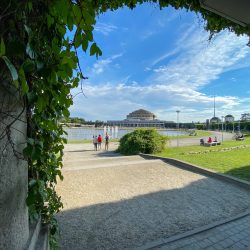The Centennial Hall is a symbol. It lasts, despite historical changes, being a bridge between generations, systems, nations. Although, we prefer to say – between people. This timeless building with the green areas surrounding it constitute a unique meeting point where everyone can find something for themselves. We treat all our guests’ needs with the same gravity. We believe that this kind of equality is what Max Berg, the architect of the building, had in mind when defining it as the Cathedral of Democracy.
We call it the “pearl of modernism in Wrocław”, and yet at the time of its creation, at the beginning of the 20th century, it had no equal in the world. It was years ahead of La Corbusier’s manifestos and handy sentences of Mies van der Rohe (Less is more), apostles of the new direction. What others postulated, was already anchoring in the ground with its strong concrete roots in Breslau. The Centennial Hall is a model implementation of objectives of the modern architectural movement (a synonymous term for modernism), granting the paramount importance to its functionality instead of ornamentation. As Louis Sullivan said: Form follows function. Simplicity. Openness. Utilitarianism.
Today, the Centennial Hall is a place frequently visited by the city’s inhabitants, tourists, architecture and urban planning enthusiasts. Organisers of the biggest cultural, sports and business events from all over the world are seeking to rent unique spaces. Inscription of the complex in the UNESCO World Heritage List in 2006 confirmed the special status of the buildings and spaces, which are the showcase of contemporary Lower Silesia and Wrocław. We are proud to invite you to this place. Feel at home.
Name of the Centennial Hall
It was founded as the Jahrhunderthalle in 1913. It was the People’s Hall. Today it is a Centennial Hall. Why? Our intuition will tell us – because it is one hundred years old! Yes, this too. But the genesis of the name has a historical background: The 100th anniversary of Frederick William III’s appeal and the 100th anniversary of the victory of Prussia over Napoleon near Leipzig. Let us recall – at the end of 1812, Napoleon Bonaparte, in panic, abandoning his Great Army, returned defeated from the area of Moscow. The Prussians and Austrians decided to take advantage of the French, still ruling Western and Central Europe, by declaring war on the Emperor.
In March 1813 Frederick William III issued an appeal To my People, calling for resistance against the French, and this event, on its hundredth anniversary, actually commemorates the Centennial Hall. Six months later, the Battle of Leipzig, known as the Battle of the Nations, took place in October 1813. It was the greatest battle in Napoleon’s campaigns and his most severe defeat. The balance of power in Europe changed, Prussia grew into a superpower, starting the reunification process.
Original name of the Centennial Hall is therefore a symbolic commemoration of an important event in the history of these lands.
















